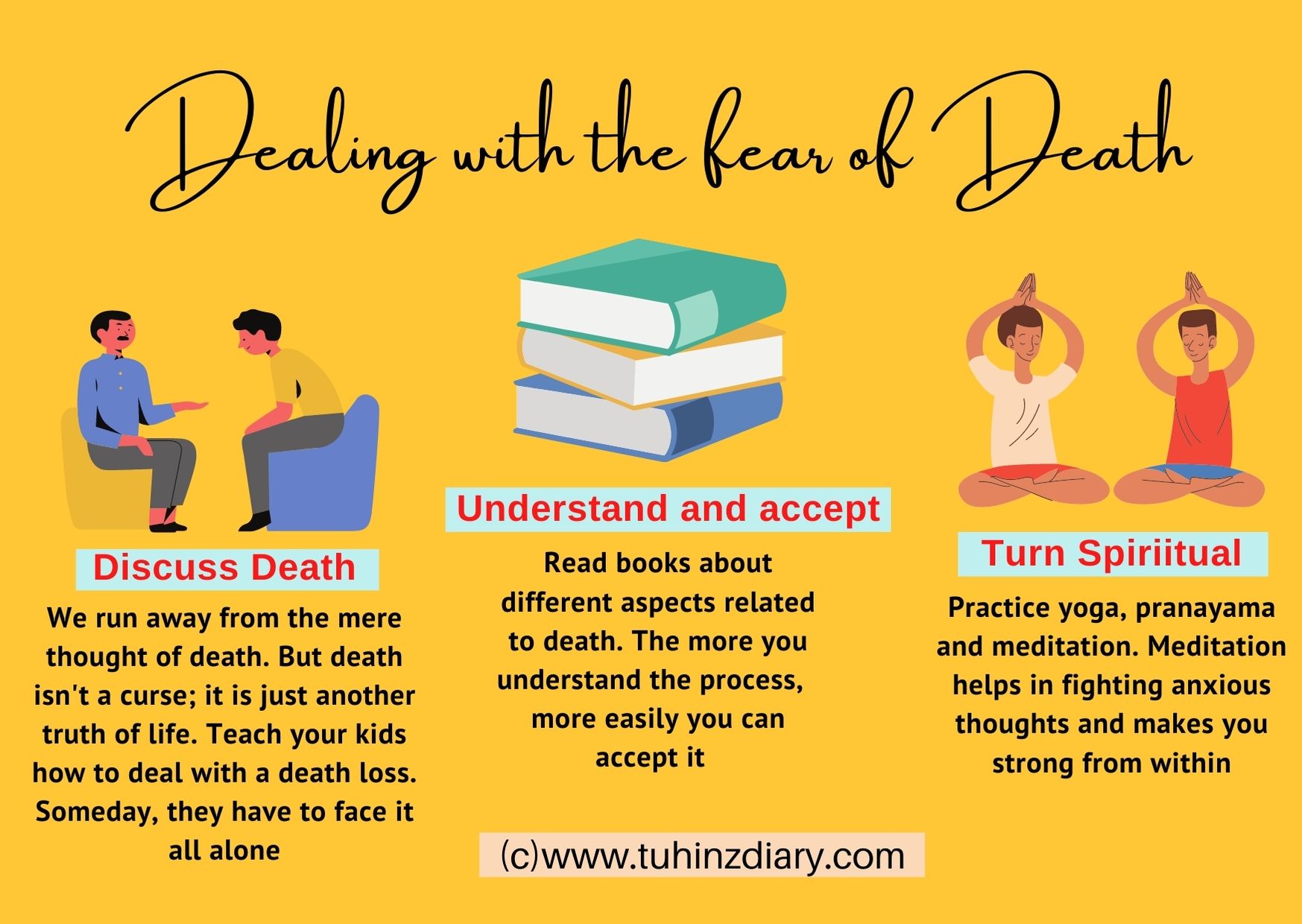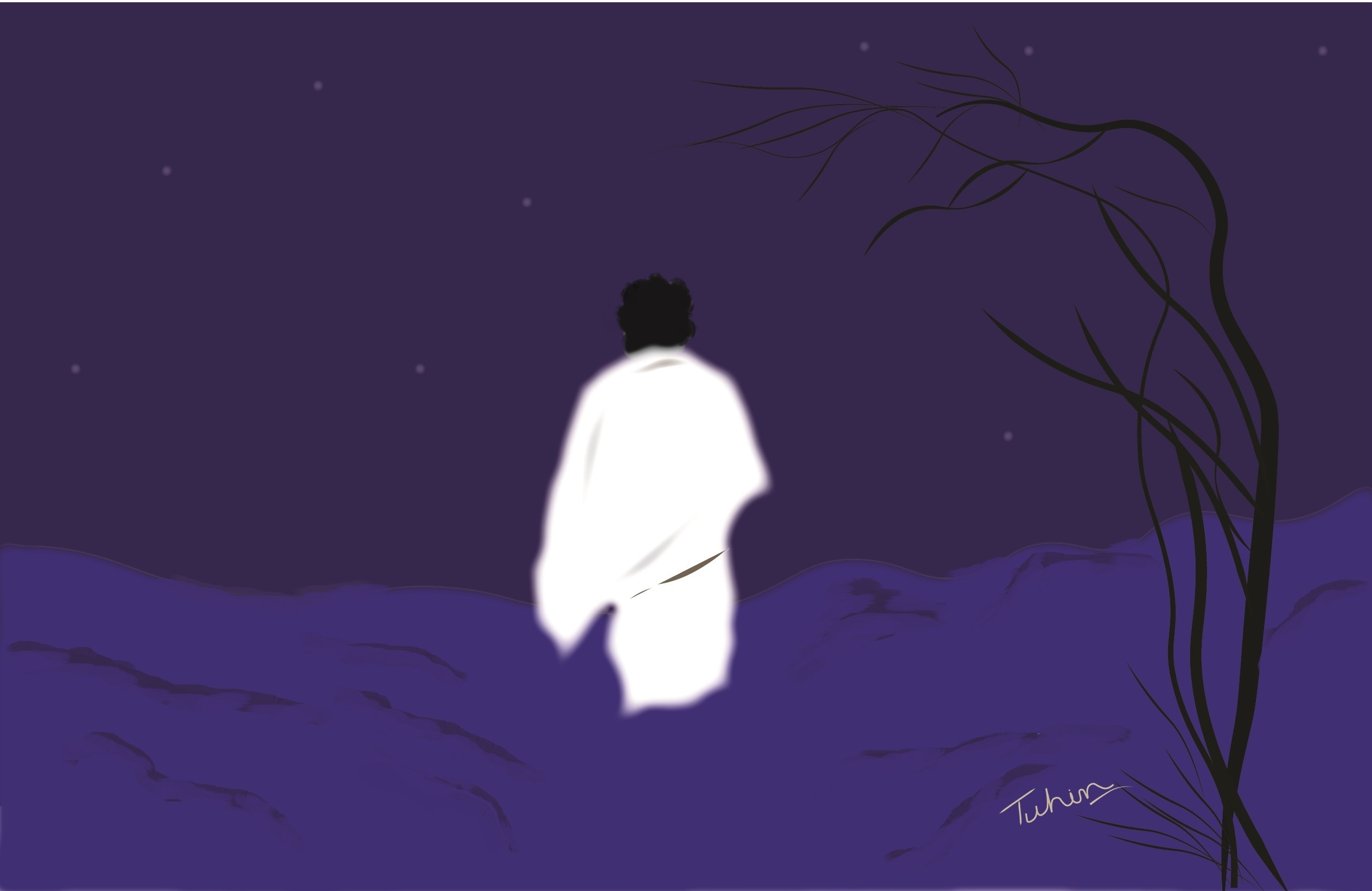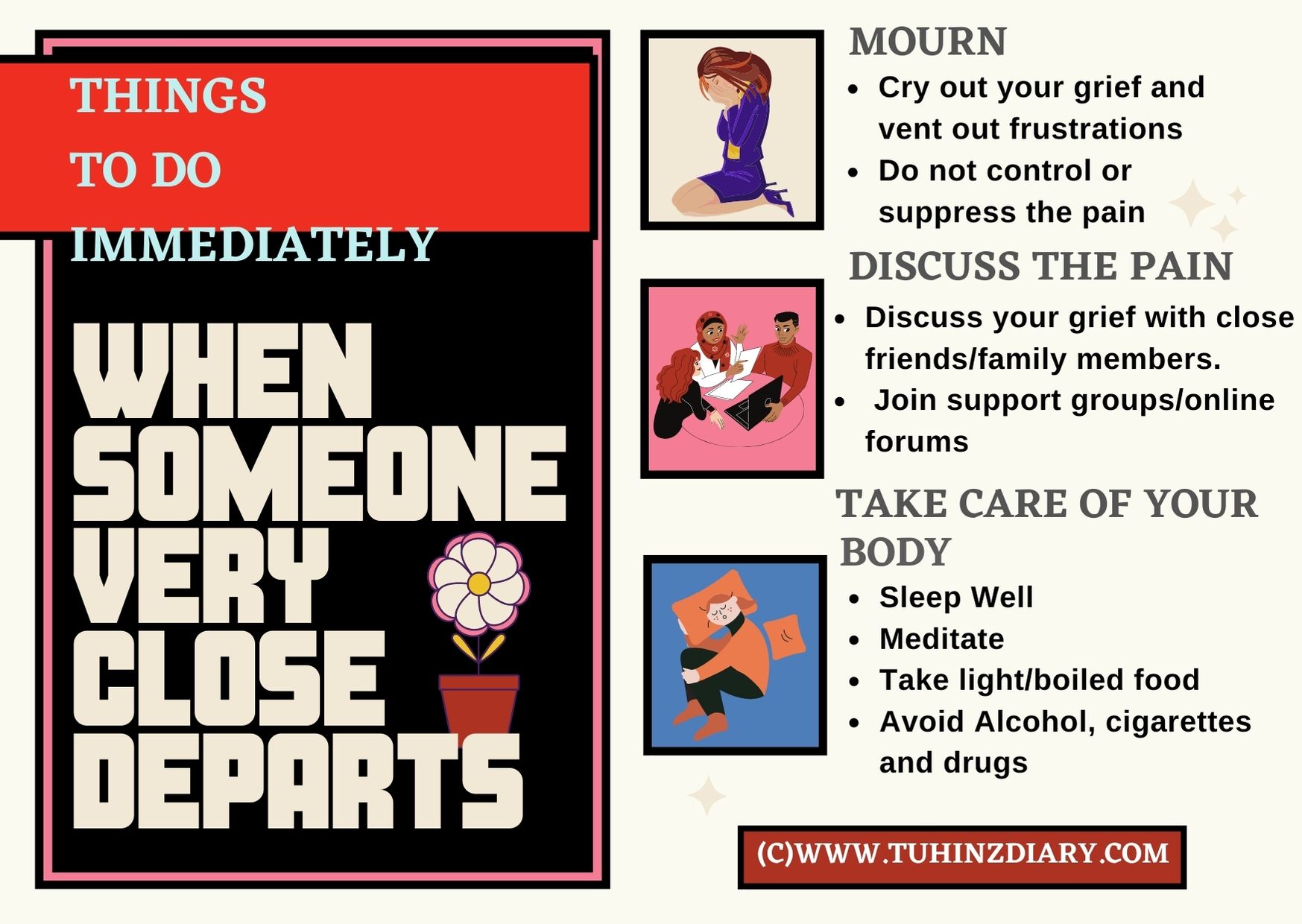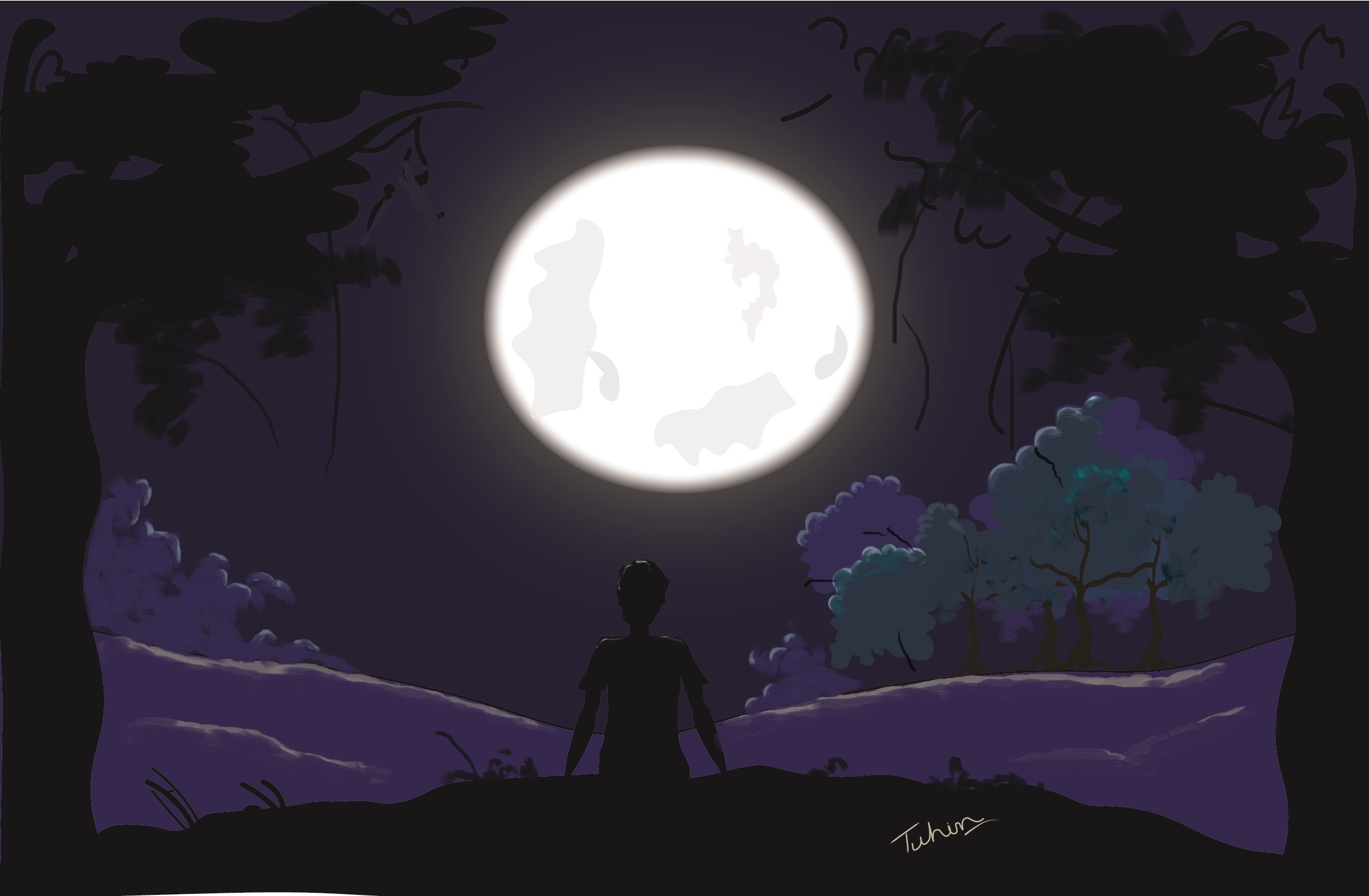Overcoming a death loss of someone you loved is not easy; it is in fact one of the toughest things to do. But everyday millions of people around the globe are doing it. If they could move on, so can you!
In the last 5 years I have lost 6 important people, 4 of whom left untimely in quick succession one after another in a short span of 11 months (in between September 2018 to October 2019).
The year 2019 changed my entire perspective towards life and has helped me to understand the true nature of life.
Like everyone else, I too have struggled to deal with the sudden losses of these precious loved ones for weeks and months. During my days of isolation and withdrawal from the world around, I realized how painful it is to get stuck in grief.
In this article I will share some practical tips from my own experience on how to overcome a death loss and move forward with grief.
In this post you will learn about:
- Why losing someone hurts- the reasons behind pain
- Why we SHOULD discuss death (and learn the ways to move forward with grief)
- The cycle of grief- 5 different stages of grief
- How spirituality helps to come out of grief
- Why getting trapped in grief period is INJURIOUS to your body
- How to deal with the pain during the first few days of the loss
- Finally, how to move on- how to create a permanent legacy of the departed person (establishing a trust,institute,organization etc in their name)
Why Death of a loved one hurts?
i) Attachment is the villain
Attachment creates a dependency.
The more we are attached to someone the more difficult it becomes to let them go.
Solution:
Detachment is the key: Now detachment doesn’t mean you are numb to everything around you. And don’t feel for anyone. It is in fact higher form of love where you do for the loved ones what needs to be done. (Click here to understand what is detachment)
Every family needs at least one person who is detached.
Let us understand with an example of two siblings Alex and Joe. Both these siblings are very close to their father. After the death of their father, Alex who was too attached could not digest this news and went in to depression. He withdrew from everything, left job and soon had to take psychiatric help. Joe on the other hand was detached (although he too loved his father a lot). So he now took responsibility of the family, performed all his responsibilities and moved on with time. Soon after a few months he started a trust in the name of his late father. He carried out regular charitable works to keep his father alive forever.
This is how detachment helps! You feel for everyone, do good to everyone but you know how to let go when the time comes.
Teach your kids to have everything in life and yet not be too attached to anything.

ii) We never discuss death
In spite of the fact that death is just another practical truth of life, it is perhaps the least discussed topic in our classrooms, college canteens, office hangouts and in our homes.
And probably this is why when the fateful day comes to bid final goodbye to someone we held in our hearts for years, we struggle to deal with it.
Nobody teaches us how to overcome a death loss; and I don’t understand why!
I often try to discuss different aspects related to death with people around me. But during those conversations one thing I have noticed is the fear, uneasiness and insecurity in their faces. And this happens due to lack of awareness about death!
Solution:
a) I don’t find any reason to run away from this topic. We should speak more on this and prepare our kids to accept any death loss calmly. We should also discuss ways to move forward with grief.
b) We should teach them how to accept and deal with unpleasant situations of life. This is because sooner or later they have to deal with this reality.
c) We should learn how and when to let go gracefully without resistance.
How Prolonged Grief (PGD) kills your body inch by inch
Depending on how long one experiences grief, medical science recognizes two major types of grief- acute (that lasts for a few months and fades gradually) and persistent (lasts for more than a year). Grief is a negative emotion which if held for a prolonged period, increases the risk of a heart attack, stroke.
To help you understand how dangerous stress is, let me mention the broken heart syndrome here. Takotsubo cardiomyopathy (or the broken heart syndrome), characterized by chest pain and shortness of breath is the process of weakening of left ventricle (heart’s main pumping chamber) of the heart due to severe emotional stress caused by sudden loss of a loved one.
In a recent study published in 2019, it was revealed that bereaved individuals who get trapped in the prolonged grief disorder, showed elevated levels of pro-inflammatory cytokines than their counterparts who experienced acute or mild grief.
We often hear about the deteriorating health conditions of elder people after the death of their spouses. In many cases it leads to death within a span of a year or so.
To understand why this happens, we have to refer a study published in the journal Ageing and Immunity. The study conducted on 41 young adults and 52 older adults revealed that older adults and senior citizens are more susceptible to stress related disorders after a prolonged period of grief.
This is because of the stress hormone cortisol, which weakens the immune system. A hormone called DHEA counteracts the effect of cortisol in young people. But as the body ages, the level of DHEA starts to fall. This affects the body’s ability to fight Cortisol resulting in lowering the body’s immunity.
To state it in simple language, grief is far more injurious to elder adults than their younger counterparts.
Spirituality Helps to Overcome Death Loss
If there is one thing that has helped me most to move forward with grief is the spiritual lessons and practices. Regular meditation, listening to podcasts and watching videos related to death sailed me through during those tough times.
Isha foundation’s series of articles on death has helped me understand this topic from an entirely different perspective. Read this excellent piece to understand what happens after death
Spirituality is the art of seeing life as it actually is! A thorough understanding of life teaches us how to accept adverse as well as pleasant situation with a balanced state of mind.

When you understand why certain things happen in life, you start accepting the situation without resisting it. And the rule of thumb is – ‘The more we resist, the more it persists’’.
When any adversity hits us, we often struggle to come out of the pain because we don’t understand why this happened and how could this happen to us!
It is in those trying times spiritual practices like meditation, chanting, reading good books helps us to come out of grief.
When Sujoy Paul, a mechanical engineer by profession, lost his bed ridden father in mid 2020, he too sought refuge in spiritual practices. When asked about what specific practices he performed, Paul “Losing him was tough, letting go was even tougher. But meditation, Sudarshan kriya and listening to knowledge sessions on death helped me to come out of the grief”
The Science of grief- Why it takes so long to overcome death loss
If you have ever experienced grief in your life, you can testify the fact that it is not so easy to swing back to normal life after losing a dear one. It takes weeks, months and sometimes years. To understand the nature of grief, we have to refer to the classic Kubler Ross grief model. In 1969, Elizabeth Kübler-Ross, a Swiss-American psychiatrist described in her book On Death and Dying the 5 different stages of grief.
P.S: Not everyone goes through the same phases in sequential order. Also the time period spent in a particular phase may vary from one individual to other.
i) Denial: When a bad news comes, the first thing we do most of the times is to deny it although our logical mind knows this is true.
Ex- This cannot be true! He will come back. He can’t leave me and depart like this
ii) Anger: Gradually in a few hours or days the mind comes back to a stable state and we finally admit the occurrence of the loss. In some cases people feel angry on themselves (for not being able to save the person), on life (for being so unfair), on the medical system (for not doing ‘enough’) and so on.
iii) Bargaining: Most of us who have ever walked through a period of grief have definitely passed through this phase of ‘what ifs’ and ‘ifs’. In this phase, we tend to bargain in our minds about a different hypothetical outcome of the event.
Ex– if only I could have taken him to a better hospital…he would have been alive now
iv) Depression
This is a phase where the mind becomes quiet and the individual slowly hibernates in to a shell of isolation. The victim avoids contact with the world and gradually starts feeling trapped. Depression is perhaps the most complicated stage of grief which require immediate attention.
Psychiatric help may be sought if required.
Check this list to know about 10 renowned organizations in India that can help you fight depression
v) Acceptance: And finally come the most beautiful phase-acceptance. It is during this phase, an individual after going through various phases of emotional turbulence finally accepts the situation and move on in life with sweet memories of the departed.
Wisdom is how quickly you reach this phase surpassing the prior phases. Practical, spiritually inclined and matured people often reach the stage of acceptance easily.
What to do immediately after the loss of a loved one?
The first few days or weeks are for mourning, to talk about the deceased and to release the pain.
i) Mourn as much as you can
Mourning for the departed is something which is common in all religions and cultures of the world. If you study and analyze different cultures, you will find that the first few days are reserved for intense mourning.
The family of the departed is relieved from all chores for a few days and relatives, neighbors and family members provide mental support to them.
There is a scientific reason why the bereaved family members are encouraged to vent out their frustrations, pain and sorrows during the initial phase of the loss. Not crying much, isolating oneself from the world digs the pain deep inside the subconscious mind which gradually becomes a part of our system.
Debopriya , a research scholar (Finance) who felt the burnt of her father’s loss believes that we should address the grief rather than running away from grief. “I used to read a lot about grief cycles and studied death related content and books to understand the process. One thought that has helped me spring back to life is the realization that death isn’t the end. And I will meet him again in some other time, in some other dimension.”
A good friend of mine, Pauline Hansen who is a spiritual blogger and healer from Denmark has explained this fact very logically that death is not the end, but a mere transition from this dimension to the one beyond this.
Meditation and chanting are healthy ways of mourning and sends vibes of peace to the soul.
You can play this blissful and soothing Om chanting. The tune is of a different level! Close your eyes sit in a comfortable position and just listen to the tune (I tried this many times).
You can also chant along with the audio if you want. And while doing so remember the person who has died. Recall the good times spent with him/her. See them in a peaceful place somewhere in the universe. Know that they are at peace.

ii) Discuss the pain
When you discuss your pain (of losing them), regret (for not being able to save them) or anger (for wrong/inadequate treatment), you actually bring those negative feelings to the surface, from where it becomes easier to heal the pain.
Any suppressed feeling for a considerable period of time is injurious to the mental as well as physical well being. A study performed in the Circulation magazine reported that an individual’s chances of having cardiovascular disorders increases manifolds due to intense grief resulting from the death loss of a near one.
iii) Take care of your body
One thing you have to understand that your life has to go on. You have to live for the people around you who need you.
Along with your mind, intense grief takes a toll on your body too. In the first few days after the loss the body needs adequate rest and proper diet.
Food:
i) Light, boiled food is preferred: Crying continuously for hours and intense grieving can lead to vomiting tendency, diarrhoea and irritable bowels. This is the reason why in many cultures, light food is recommended for the first few days.
a) Drink plenty of water to stay hydrated. Fresh juice/ veg soups (in limited quantity) can also be taken
b) Avoid spicy and oily food.
c) No junk or tinned/canned food.
ii) Avoid alcohol and cigarettes: People often seek refuge in these addictions to come out of pain. Alcohol, drugs or cigarettes may give momentary relief but in the long run these will make the situation more complicated by making the mind negative and lowering down your confidence and energy.
Rest:
Along with good diet, you need adequate rest too. Sleep deprivation is very common during the initial stages of grief. If you find it tough to sleep at night, try doing yoga nidra (yogic sleep), some guided meditation and a few breathing exercises.
Though Yoga-nidra and meditation are not alternatives to sleep, still these can provide rest to the body by calming down the mind.
Links for Yoga-nidra:
a) Yogic sleep- Deep and Relaxing
Links for Guided meditation:
a) Meditation for better sleep
b) Guided meditation for sleep
c) Meditation to calm the mind
Links for breathing exercise for stress relief
b) Breathing techniques & guided meditation to reduce anxiety

How to Move Forward With Grief Gradually
Once the mourning period is over, the rituals being done, now it is time to move on in life.
(Read Laura’s story to know how she came out of grief after her husband’s death)
One of the best ways to move forward with grief is to fill your mind with an aim to do something for the person who has left; something to keep them alive even after they have left the body.
i) Create a memory room
This is one of my favorites (I have a small one). Dedicate a room in honor of the departed (for all the family members and friends whom you have lost so far). Hang their photographs, keep their belongings (specs, watches, pen, their achievements, certificates etc).
Whenever you feel alone, exhausted and low, just visit that room and sit there for a few minutes and imagine yourself hanging out with your departed tribe. You can also meditate or read books and spend some quality time once a while.
ii) Start a memorial in their name
Many families start an annual memorial trophy in memory of a beloved person who has died. Depending on what sport is popular in your town/city/district, you can start an annual memorial trophy.
You can also carry out school level quiz, merit test, debate or similar memorial contests for kids in your town.
ii) A permanent establishment in their name
If you are financially sound, then you can think about starting something permanent that can benefit a few hundred people in your town. A few good ideas can be:
a) Skill development center: You can start a skill development center where you can teach various life skills such as Critical Thinking, decision making, stress management, empathy and leadership etc as well as employment skills such as sewing, digital marketing, public speaking, coding etc to meritorious students of your town.
b) School for under-privileged
c) Coaching centers: You can also start a coaching center in their name. Select a few meritorious yet financially challenged students and train them for JEE (engineering), NEET UG/PG (medical) or MET/CAT (MBA).
For inspiration, refer to super 30’s story
d) Old age home: You can start a small shelter house/old age home to provide roof to a few ill fated senior citizens around your locality or town.
e) A spiritual institute: What better way to celebrate your loved one’s life by introducing people to the world of spirituality! You can teach people yoga, meditation and pranayama to make their lives better.
You can also arrange spiritual discussion and knowledge sessions for people who are struggling in their lives.
iv) Arrange regular charitable works
If they have died of a medical ailment, this is a good idea to start a trust and help patients suffering from the same ailment financially, emotionally and physically in their memory.
If the person who has died used to be a sports lover, you can sponsor enthusiastic young sportsmen from financially deprived families to help them manage their expenses.
If the person who died was in to education industry, you can take up this noble initiative of educating a group of poor kids.
And the list is endless. The point is you can take any initiative depending on the inclination of the person toward that particular activity.
To Sum it Up
It is definitely not easy to overcome a death loss. However it is not impossible too. After a few days or weeks of mourning, you should realize that life has to move on. And your pain will send the vibrations of pain to the soul.
So for everyone’s good, we should come out of grief. And one great way to do this is to start working toward fulfilling the person’s unfulfilled dreams and ambitions.
And finally believe that death is just the end of the physical body. The soul never dies. It just jumps to a higher dimension. Someday, someway our paths will cross again, we will meet again…to continue this unfinished chapter

